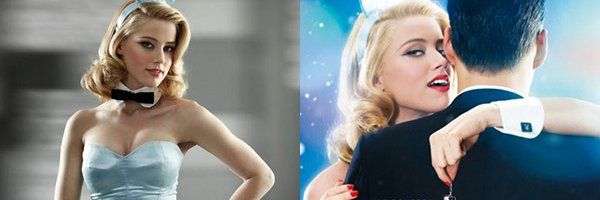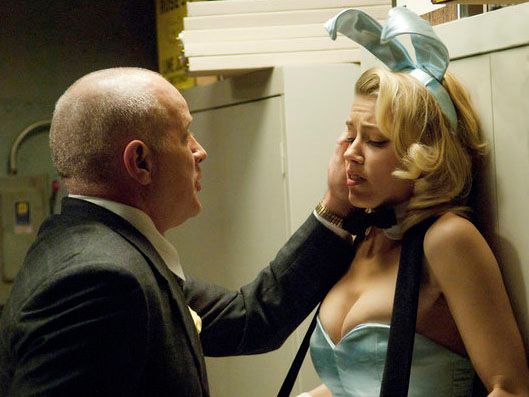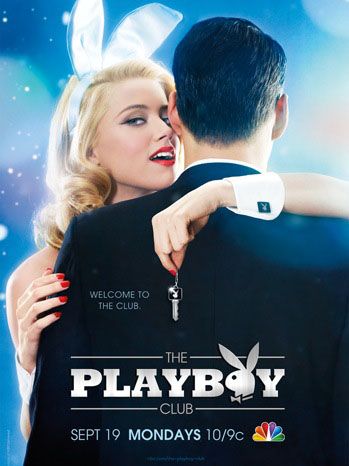The provocative new NBC drama The Playboy Club (premiering on September 19th) takes place in Chicago in the early 1960's, at a time and place that challenged the existing social mores and transformed American culture forever. The legendary and seductive club is filled with beautiful Bunnies, striving for their own independence and careers. When innocent new Bunny Maureen (Amber Heard) accidentally kills the patriarch of the Bianchi crime family, Nick Dalton (Eddie Cibrian) – the ultimate playboy and one of the city’s top attorneys – comes to her aid. At the Playboy Club, everyone has their own ambitions and agendas, and they are all hiding secrets.
During a recent interview to promote the show’s upcoming Fall premiere, actress Amber Heard talked about wearing her Bunny costume, that her character has her own share of secrets and skeletons in her closet, how the women that worked at the Playboy Club were empowered by their sexuality rather than being victimized by it, and how this was a time when there were different opportunities and expectations for women. She also talked about how she still hopes to be putting on a costume of a different kind for Red Sonja. Check out what she had to say after the jump:
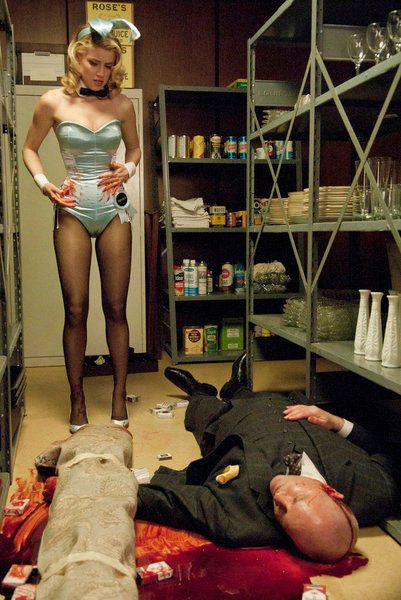 Question: What is it like to wear those Bunny costumes?
AMBER HEARD: They are built to be exact replicas of the suits that the actual Bunnies wore in the ‘60s. When I put it on for the first time, it took me back to this time that was this very, very specific moment in history when this existed. It’s something that feels naughty, yet nice. It feels edgy and cool and different, and it’s a lot of fun. I think part of why I really liked this series is that it takes place in the ‘60s, at a time that lends itself to the truth of feminine form and the true silhouette. I was excited about the suit because I’m excited about the time and place that it takes place in. It is a different silhouette for women. This is pre-airbrushing, pre-digital enhancement, pre-plastic surgery. For the most part, this is women with natural curves. I was excited that I could keep them.
Are curves coming back?
HEARD: If I have to drive them back myself, by golly they will.
Does the costume really help you get into character?
HEARD: You can’t be in the suit for more than a few seconds without really feeling like you’re a part of the show. That’s ultimately what it comes down to. You’re transported. These clubs no longer exist, in the way that they existed then, and it’s special because these costumes are just as specific as the club is. They’re just as fantastic and imaginative, and they exist nowhere else. So, you put on the suit and you’re instantly transported back to this time, with these cigar-smoke-filled rooms, the music, the glitter, the heels, the fishnets and the whole nine yards.
What have you gotten from talking to people, like Hugh Hefner and the Bunnies, who were around at that time?
HEARD: I have been blown away by the amount of trailblazers, trend-setters and people that weren’t afraid to go against the status quo and make changes in their lives for the better, challenge themselves to do something that wasn’t necessarily approved of, and do something new and different. Personally speaking, that’s something that I aspire to always challenge myself with. I want to be true to myself, to keep challenging the norm, to keep challenging the expectations people set forth for me on my behalf, and do what I feel is right for me. A lot of the people that I’ve met, that were involved in the club, were doing just that in the ‘60s. Hugh Hefner was a perfect example. He decided to integrate his clubs, at a time when it was virtually unheard of. He hired African American Bunnies on the same basis as he did white women. He also allowed African American key-holders and performers. He did not discriminate, on any level, in his clubs, and he did not allow management to discriminate for him. That’s a perfect example of the kind of trendsetter that I met when I was doing research for this project.
Question: What is it like to wear those Bunny costumes?
AMBER HEARD: They are built to be exact replicas of the suits that the actual Bunnies wore in the ‘60s. When I put it on for the first time, it took me back to this time that was this very, very specific moment in history when this existed. It’s something that feels naughty, yet nice. It feels edgy and cool and different, and it’s a lot of fun. I think part of why I really liked this series is that it takes place in the ‘60s, at a time that lends itself to the truth of feminine form and the true silhouette. I was excited about the suit because I’m excited about the time and place that it takes place in. It is a different silhouette for women. This is pre-airbrushing, pre-digital enhancement, pre-plastic surgery. For the most part, this is women with natural curves. I was excited that I could keep them.
Are curves coming back?
HEARD: If I have to drive them back myself, by golly they will.
Does the costume really help you get into character?
HEARD: You can’t be in the suit for more than a few seconds without really feeling like you’re a part of the show. That’s ultimately what it comes down to. You’re transported. These clubs no longer exist, in the way that they existed then, and it’s special because these costumes are just as specific as the club is. They’re just as fantastic and imaginative, and they exist nowhere else. So, you put on the suit and you’re instantly transported back to this time, with these cigar-smoke-filled rooms, the music, the glitter, the heels, the fishnets and the whole nine yards.
What have you gotten from talking to people, like Hugh Hefner and the Bunnies, who were around at that time?
HEARD: I have been blown away by the amount of trailblazers, trend-setters and people that weren’t afraid to go against the status quo and make changes in their lives for the better, challenge themselves to do something that wasn’t necessarily approved of, and do something new and different. Personally speaking, that’s something that I aspire to always challenge myself with. I want to be true to myself, to keep challenging the norm, to keep challenging the expectations people set forth for me on my behalf, and do what I feel is right for me. A lot of the people that I’ve met, that were involved in the club, were doing just that in the ‘60s. Hugh Hefner was a perfect example. He decided to integrate his clubs, at a time when it was virtually unheard of. He hired African American Bunnies on the same basis as he did white women. He also allowed African American key-holders and performers. He did not discriminate, on any level, in his clubs, and he did not allow management to discriminate for him. That’s a perfect example of the kind of trendsetter that I met when I was doing research for this project.
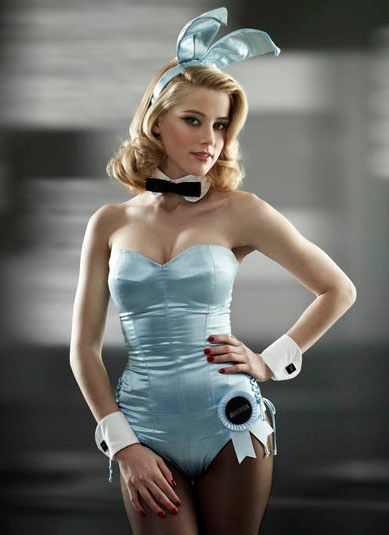 What can you say about who Maureen is and what her secrets are?
HEARD: Maureen has got a lot of secrets. She’s got a lot of skeletons in her closet. She’s running from something, at the same time she’s trying to find something. She has big things in her future, and a very, very dark past. Maureen, in her young life, has lived and been through enough, and survived enough, to have lived four lifetimes over. She’s an incredibly complex character, and one that’s going to surprise us, at every turn.
How modern and empowering was the Playboy Club?
HEARD: There were many women who went on to do things, like have careers and be entrepreneurs. There are women who have talked to us about their experiences. They might exist, but I have yet to meet an ex-Bunny, who’s disgruntled about her experience. On the other hand, I have talked to a lot of women who look back fondly on those memories and are thankful for that experience, or for the money it earned them and, therefore, the opportunities it was later able to afford them. I also think that the backdrop of the '60s and of the club is going to be important to our story because everything was about to happen. This is right before the bubble burst. This is pre-Stonewall, pre-women’s lib and pre-civil rights revolution, but it’s right at the cusp, before everything started to boil over. I think that’s going to lend itself really well to our character-driven piece.
Are you aware of the protests against the show? Does that have any effect on you?
HEARD: It wouldn’t have any effect on me, even if they had seen the show. But, they haven’t seen the show, so what does that matter to me?
Do you feel like you’re being asked to answer for the way things were in the ‘60s?
What can you say about who Maureen is and what her secrets are?
HEARD: Maureen has got a lot of secrets. She’s got a lot of skeletons in her closet. She’s running from something, at the same time she’s trying to find something. She has big things in her future, and a very, very dark past. Maureen, in her young life, has lived and been through enough, and survived enough, to have lived four lifetimes over. She’s an incredibly complex character, and one that’s going to surprise us, at every turn.
How modern and empowering was the Playboy Club?
HEARD: There were many women who went on to do things, like have careers and be entrepreneurs. There are women who have talked to us about their experiences. They might exist, but I have yet to meet an ex-Bunny, who’s disgruntled about her experience. On the other hand, I have talked to a lot of women who look back fondly on those memories and are thankful for that experience, or for the money it earned them and, therefore, the opportunities it was later able to afford them. I also think that the backdrop of the '60s and of the club is going to be important to our story because everything was about to happen. This is right before the bubble burst. This is pre-Stonewall, pre-women’s lib and pre-civil rights revolution, but it’s right at the cusp, before everything started to boil over. I think that’s going to lend itself really well to our character-driven piece.
Are you aware of the protests against the show? Does that have any effect on you?
HEARD: It wouldn’t have any effect on me, even if they had seen the show. But, they haven’t seen the show, so what does that matter to me?
Do you feel like you’re being asked to answer for the way things were in the ‘60s?
HEARD: I am an actor and, at the end of the day, I’m playing a role that has been written for me. It’s one that I’ve chosen, but one that is ultimately written and designed for me, so I don’t take it personally. All the questions are legitimate. I understand them. I think that we come from a somewhat puritanical and chauvinistic point-of-view, so that when we’re asked questions about women being empowered by sexuality, we often confuse it with women who are victimized by it. I have to make that distinction because, in 2011, we should not see the two as the same thing. They are very different. Women who are empowered by it and have choices based off of their sexuality, are very different from the ones that are being taken advantage of.
All the Playboy clubs were run by men, and Hugh Hefner probably had a lot to say about how women were portrayed, and what they could and couldn’t do. How are women running the show here, in reality?
HEARD: I think there is a common, puritanical way that we look at things where, if it involves sexuality, somehow the women must be compromised. It’s just chauvinistic to deny women their sexuality. It’s about empowering. It comes down to choices. If the choices are available and they’re making that choice, they’re not being exploited.
How do you walk the line, so as not to make this show exploitative of women?
HEARD: Regarding Maureen, don’t underestimate that character and her intelligence, and the journey that she’s going to take to really rise above that. I think that the moment that Nick (Eddie Cibrian) helps her is more of a reflection of who Nick is. That comes at no cost to her. I think Maureen allows herself to be helped when she needs it, and by no means relies on any character, male or female, in this story, and never has. We’ll see that journey, and that’s part of why I’m so excited to be involved in this project, and chose this project as a platform to deliver that message, as well as others. This is about choice. Ultimately, it’s a different generation. There were different opportunities and different expectations for women. I am fortunate to be a part of this new generation where I don’t need to choose between combat boots and an apron. I can do it in heels.
How do you feel about someone like Gloria Steinem saying that Mad Men is so popular right now because men who run networks and write shows have a nostalgia for that time, and what men and women were like then?
HEARD: Well, she forgets the viewership in that statement. She talks about men writing the shows and us girls somehow being puppets in this play that we have no control over. But, every woman on the show is an independent, self-sufficient, intelligent woman making a career for herself, and we’re representing a group of women who were doing the same, in a time where options were completely different.
Has your coming out changed the way Hollywood perceives you?
HEARD: It makes no difference to me, personally. I’ve always been a private person and I’ve always valued my private life. A lot of the media attention surrounding my relationship has been frustrating simply because I’m a private person. But, at the end of the day, I think there is an important moment happening in our society right now, and I have to do the right thing. At the end of the day, I don’t label myself one way or another. I come from a place where I find it hard to identify with a label. I’ve dated men in the past, and now I’m dating a woman, and I see it as ultimately no big deal.
Are you still doing Red Sonja, and are you looking forward to that costume?
HEARD: I don’t know. I think that that would be a change from my Playboy suit, but a welcomed one.

